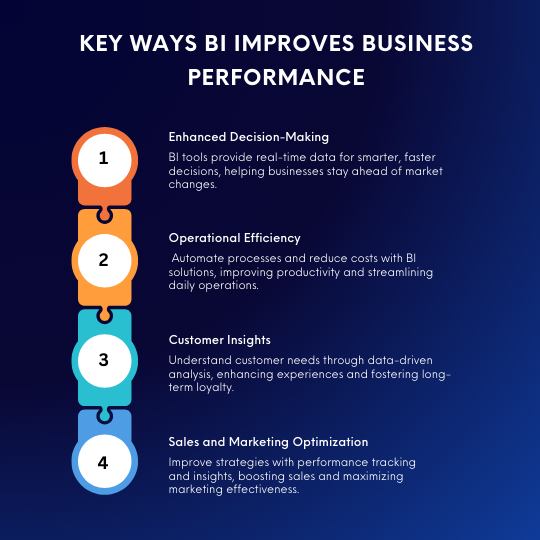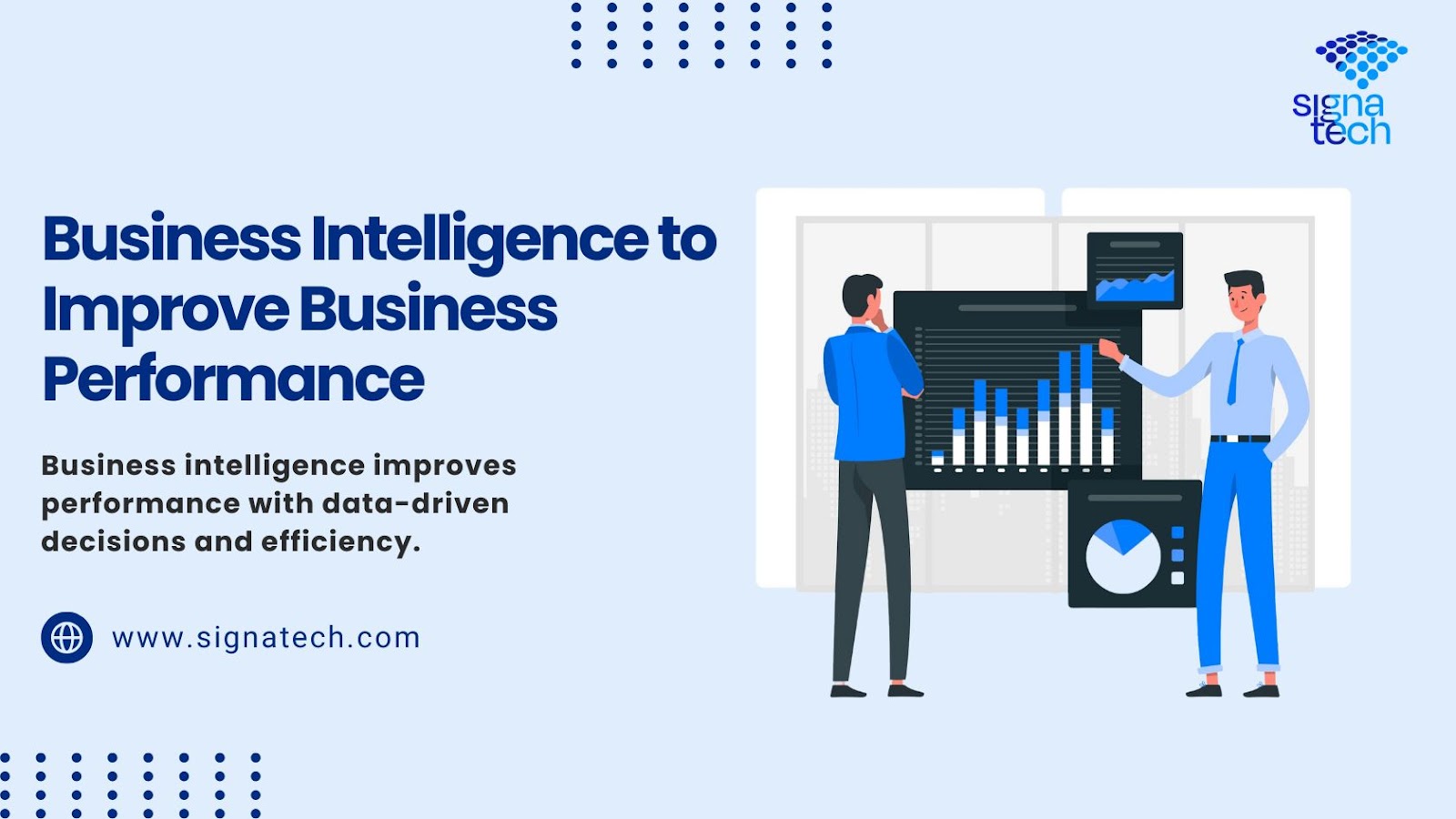Staying competitive in business requires more than intuition and experience. Data has become the cornerstone of business success, and Business Intelligence for Business Performance is the key to unlocking its full potential. BI tools empower companies to analyze historical and real-time data, providing actionable insights that drive performance improvements across all departments.
As the volume of data generated by businesses continues to grow, BI solutions have become indispensable for making informed decisions, optimizing operations, and identifying new growth opportunities. With the right BI strategies, companies can transform raw data into a valuable asset for long-term success.
Moreover, BI is not just about collecting data but about deriving meaning from it. Businesses equipped with robust BI systems can detect market trends early, predict customer needs, and optimize resource allocation for maximum efficiency. The ability to make data-driven decisions is a competitive advantage that no modern enterprise can afford to ignore, as highlighted in how Business Intelligence can fuel business growth.
Key Ways BI Improves Business Performance

1. Enhanced Decision-Making
Most importantly, BI tools are capable to provide real-time analytics; thus, business leaders can make informed decisions immediately. Information is powerful, and having the right info helps differentiate possibilities from facts, and reduces guesswork and potential risk. For instance, a retail company can analyze sales trends through BI and adjust its marketing strategies accordingly.
Moreover, real-time decision-making capabilities empower businesses to react proactively to market changes. Effective use of BI can help companies predict demand spikes, optimize pricing strategies, and improve customer satisfaction through a better understanding of purchasing behaviors.
2. Operational Efficiency
BI tools help automate data collection, reporting, and analysis, which streamline business operations. Automation reduces manual work, eliminates repetitive tasks, and enables an employee to focus on the key activities. For example, manufacturing firms employ Business Intelligence for Business Performance to oversee production processes and spot inefficiencies.
BI will also help you in identifying process bottlenecks and will suggest you improvements. Companies can utilize these insights to redistribute resources, optimize workflows, and decrease operational costs.
3. Customer Insights
Knowing more about your customers is key to providing customized experiences. BI tools examine the data from different points of contact — social media, websites, to customer feedback. It enables businesses to customize their services, drive customer satisfaction, and foster loyalty in consumers.
Also, BI systems with predictive analytics can foresee the needs of its customer which allow businesses to run pinpoint marketing pushes and give personalized recommendations
4. Sales and Marketing Optimization
BI tools monitor the performance of marketing campaigns, enabling companies to utilise their resources appropriately. Companies can fine-tune their marketing strategies and measure metrics such as conversion rates, customer acquisition costs, and ROI for optimal results.
Business Intelligence for Business Performance ensures that BI dashboards equip sales teams with the ability to track the performance of the sales pipeline, the interaction of customers with sales, and detect high-value opportunities.
Real-World Applications of BI in Different Sectors
Retail
BI tools allow retailers to manage inventory, forecast demand, and analyze customer purchasing patterns. If a fashion retailer tracks what products are in demand across various regions, they can align stock to balance demand with potential supply chain shortages.
Business Intelligence for Business Performance has given retailers the power to analyze footfall patterns, track customer preferences as well as evaluate the effectiveness of a promotion.
Healthcare
Healthcare practitioners use BI to enhance patient care, elevate resource management and ensure compliance. Predictive analytics helps to identify potential health risks and optimize treatment plans.
BI tools help hospital administrators gather intelligence on patient outcomes, resource utilization, and operational efficiency.
Finance
Banks and financial institutions apply BI for fraud detection, risk management, and performance analysis. monitoring suspicious transaction in real time enables identifying strangled activities and stop financial crime.
Business intelligence-driven insights are also explored to provide assistance for portfolio management, credit risk assessment, and regulatory compliance.
Manufacturing
Manufacturers use BI to see how their production lines are working, anticipate machinery failures, and optimize their supply chains. This not only minimizes downtime but also amplifies productivity.
Moreover, with the introduction of Business Intelligence for Business Performance solutions, manufacturers also have the option to monitor supplier performance, streamline inventory levels, and reduce production costs.
Marketing
Marketing teams utilize BI tools to track campaign performance, analyze audience demographics, and tailor content to user preferences. BI-derived insights allow users to understand customer journeys, optimize ad spend, and improve ROI.
Choosing the Right BI Tool for Your Business
A BI tool aligned with your business goals is pivotal for maximizing its impact. Some to consider include:
- User-Friendly Dashboards: Simplify data interpretation for non-technical users.
- Data Integration: Combine data from various sources into a single platform.
- Predictive Analytics: Forecast trends and outcomes to support strategic planning.
- Customization: Tailor reports and dashboards to meet specific business needs.
- Mobile Accessibility: Access BI insights from anywhere using mobile devices.
- Scalability: Ensure the solution can grow alongside your business.
The Future of Business Intelligence
BI is constantly changing, mainly due to innovations in AI, machine learning, and big data. So Business Intelligence for Business Performance tools of the future will come with more user-friendly interfaces, improved predicting capabilities, and advanced automation. Augmented analytics — and indeed, analytics overall — will rely more on machine learning and natural language processing to ensure analysis is even more accessible for non-technical users.
With companies moving towards cloud-based BI platforms, data sharing and collaboration will become more seamless. The integration of BI with Internet of Things (IoT) devices will broaden its application across sectors.
For organizations wishing to maintain competitiveness, Business Intelligence Consulting Services are no longer just a luxury, but rather a necessity. BI tools turn data into insights and help decision-making, processes, and customer satisfaction. The right BI strategy can deliver transformative performance improvements no matter whether you work in retail, healthcare, finance, or manufacturing.
Data-driven businesses reap many benefits, which is the reason that the future is theirs, and BI streamlines this process. Make sure valuable insights don’t get missed—get started with BI now.
Take your business performance to the next level with Signatech’s cutting-edge BI solutions. Contact us today to get started!
